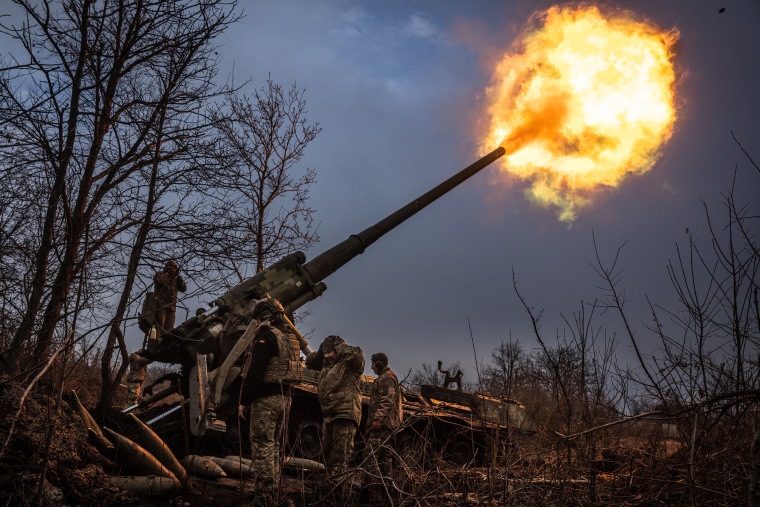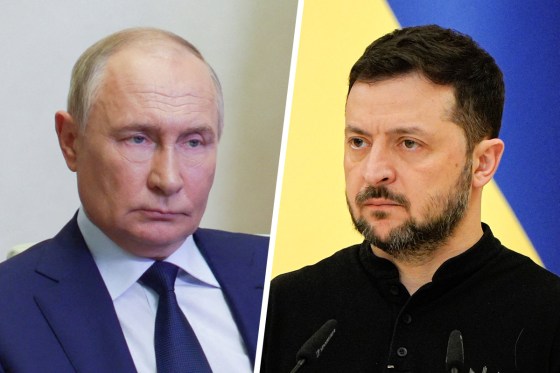Ukrainian President Volodymyr Zelenskyy has accused Vladimir Putin of being “afraid” to negotiate after his Russian counterpart refused to engage in peace talks with him and once again questioned his legitimacy.
The latest exchange between the two leaders came amid mounting pressure on both sides from President Donald Trump to end the war. Trump last week threatened Moscow with a new tranche of sanctions, saying that Zelenskyy was ready to negotiate a “deal” to end the war that has been grinding on for almost three years.
Writing late Tuesday in a post on X, Zelenskyy said that “Putin once again confirmed that he is afraid of negotiations, afraid of strong leaders, and does everything possible to prolong the war.”

He made the comment after Putin told state broadcaster Rossiya 1 that the Ukrainian leader “has no right to sign anything” because of his “illegitimacy.”
Shortly after Russia unilaterally declared its annexation of areas in and around four eastern Ukrainian regions — Donetsk, Kherson, Luhansk and Zaporizhzhia — in September 2022, Zelenskyy issued a decree formally declaring talks with Putin “impossible,” although it left the door open to talks with Russia.
Putin said Tuesday that this should be revoked by Ukraine's parliament before any talks could take place and that the “legitimacy” of negotiators from Kyiv should be “verified by lawyers.”
“We can do it the easy way, or the hard way — and the easy way is always better,” he added.
Putin’s repetition of his claim that Zelenskyy is not Ukraine’s legitimate leader appear to stem in part from the martial law banning elections that Zelenskyy imposed after Russia’s full-scale invasion Feb. 24, 2022.
If the law had not been in place, Zelenskyy’s term would have ended in May last year.
Former Russian President Dmitry Medvedev followed Putin’s remarks Wednesday, telling the Russian news agency Ria Novosti that Zelenskyy “has simply become illegitimate” and “he may even try to get re-elected, but this is extremely dangerous for him.”
World leaders' calculations regarding the war in Ukraine have changed in recent weeks, as Trump began his second term and hopes are rising that ceasefire talks are on the horizon.

Even so, "what looks like a growing consensus in the West that some form of peace talks between Russia and Ukraine is coming closer doesn’t always take account of whether Russia and Ukraine themselves might see negotiations as viable or even useful," Keir Giles, a defense analyst at London’s Chatham House think tank, told NBC News.
While European leaders have accelerated planning for a worst-case scenario in which the Kremlin pushes troops further into the continent and Washington does not come to their aid, Trump has made increasingly strong threats against his Russian counterpart.
Trump's claim that he would end the Ukraine war in one day after taking office did not come to pass, although members of his national security team have in recent weeks acknowledged the difficulties of brokering a possible peace accord.
“Let’s set it at 100 days and move all the way back and figure a way we can do this in the near term to make sure that the solution is solid, it’s sustainable, and that this war ends so that we stop the carnage,” retired Lt. Gen. Keith Kellogg, Trump’s pick to serve as special envoy to Ukraine, told Fox News last month.
Still, the conflict has shown no signs of de-escalating despite Trump's departure from the warmer sentiments he conveyed during his first term.
“If we don’t make a ‘deal,’ and soon," Trump said last week in a social media post, "I have no other choice but to put high levels of Taxes, Tariffs, and Sanctions on anything being sold by Russia to the United States, and various other participating countries.”
That shift in tone toward Russia is a "wildcard" in efforts by the Trump administration to end the war, Giles said, and "a striking and remarkable shift from his first term in office."
"Observers of Trump have noticed that what he says does not always translate directly into what he directs his administration to do," he told NBC News, adding that even a superficial change in tone is "a cause for Ukraine and its friends to have limited optimism."
Deputy Russian Foreign Minister Sergei Ryabkov told Russian state press Monday that no one from the Trump administration had so far reached out to the Kremlin to set up a meeting with Putin.
For his part, Zelenskyy called Trump’s threats of sanctions “just and fair” in an interview on Fox News on Tuesday.
Meanwhile, Russian troops continue to make territorial gains in Ukraine after capturing the village of Dvorichna in northeastern Kharkiv, the army said Tuesday.
